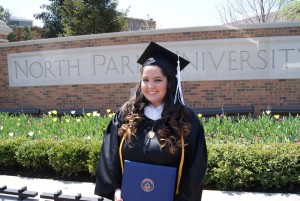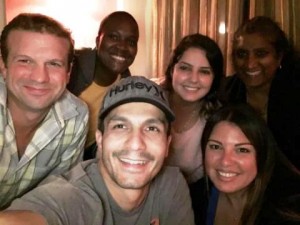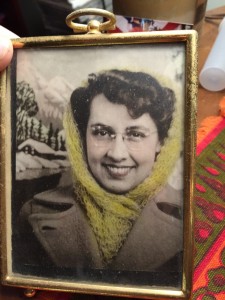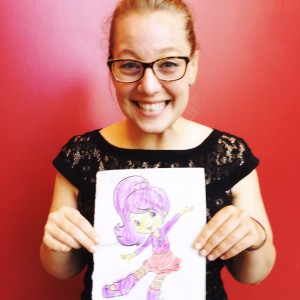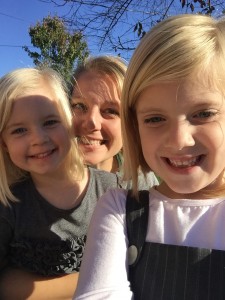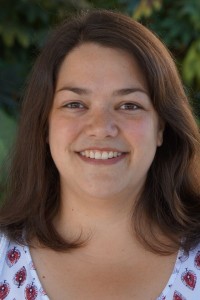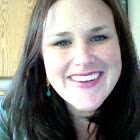Jones is the pastor of the Evangelical Covenant Church in Stromsburg, NE. She earned an MDiv from North Park Theological Seminary in 2012. Abby is mom to Stella, Lucy, Mabel and Harper. Read more of Abby’s writing at sustainabletheology.com.
Looking back, I’m not sure how I survived the baby years. I’m just coming out of the throws of 24/7 caregiving after five years with three babies. My youngest is 18-months-old and all of the baby gear is officially gone. There are no more swaddles or swings, bouncers or binkis. There is just one item I’m hanging on to, because the sleep and sanity of our family depends on it. Each and every one of our babies required a sound machine to fall asleep at night. The crackling static, like a radio dial between stations, signals my brain that the day is winding down.
When I turn the dial, it begins to drown out the to-do list, the projects and responsibilities until I drift off to sleep. White noise is great at distracting me from the things that matter. And I’ve come to realize that the sound machine isn’t the only thing feeding me white noise. During the day there’s a constant static drowning out the sounds that matter. It’s the vibrating of my phone with a new text, voicemail, phone call or email. It’s the dinging of a new tweet, pic or notification. It’s the alert of a new post, article or comment. No matter where I am or what I’m doing, I’m being fed everything from political controversy to fashion trends, global conflict to religious memes. All of it is covertly informing my identity.
There’s no escaping the GoogleAds that know what I’m lacking. I’ve read countless articles about how Facebook has made us sadder and less satisfied. But all of this discontentment didn’t begin with the advent of the internet. Genesis 3 tells us that the curse of sin is that woman will look to her husband and her husband to his work to inform their identity.
This creates a dependency on someone or something other than God. For most of human history the value of a woman has been based on her role as mother, and of course the man she depends on to fulfill this role. As for men, their value has been wrapped up in their ability to provide for their families. Their success, their worth, their identity was in what they accomplish outside of the home. And it will never be good enough, until they finally die and return to the ground.
Women looked to men. Men looked to work. And we wonder why our lives sound more like noise than songs. For generations we’ve heard that this is the right way to do things. It wasn’t too many years ago that a woman would introduce herself as “Mrs. Jeff Jones”. And to this day, one of the first questions that man gets asked by a new acquaintance is “What do you do for a living?”. A woman, in God’s eyes is not valuable because of her husband. A man, in God’s eyes is not valuable because of his labor.
We’re in-between stations.
Twist to the left and you can tune into creation. In the beginning, God’s hands created and formed the beautiful and wonderful and majestic world, and God made man and woman imago dei (Latin for “image of God”). They were created to be co-workers, caring for God’s masterpiece hand in hand. But sin cracked this image. There were no gender roles. There was no division of work. There was only the role of image bearer and the work of stewarding creation.
Twist the dial to the right and you can tune into the reality of God’s Kingdom. It’s the music of God’s restorative justice making all things new. Returning the creation back to it’s intended state. In this Kingdom, where God rules over all of creation, the image of God is not only repaired, but renewed.
We were made adequate to do all of the work God made us to do at creation. We’ll be remade to do all of the work God made us to do in the Kingdom. But in the middle, we squabble about who should be able to do what work. We’ve muted what is beautiful in the beginning and at the end, causing confusion about our purpose and our identity. We end up taking our identity from soundbites in the form of buzzes, dings and tweets. Everything here in the middle is subject to the noise.
After listening to the white noise all of these years, when I’m quiet and listening to it at the end of the day, sometimes I can make out music in the background. Sometimes it startles me, and sometimes it’s subtle. But it’s there. There’s a song breaking through the noise. We just have to listen for it.

